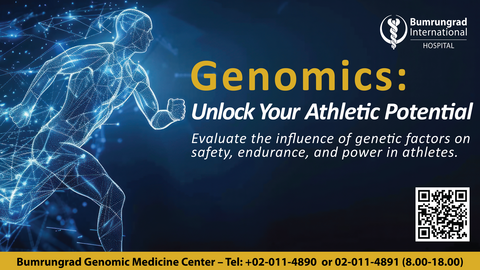Membres
Unlock Your Athletic Potential with Genomics

By Bumrungrad Hospital
Have you ever wondered what makes elite athletes so extraordinary? It is not just hard work and dedication; genetics play a crucial role. Scientists have identified hundreds of genetic variations linked to athletic abilities, shaping the characteristics of elite athletes.
Genetic Contribution vs. Non-Genetic Factors
Research estimates that genetics account for approximately 50% of athletic performance. However, non-genetic factors—such as training techniques, diet, and environment—also significantly influence athletic ability. These factors can alter gene expression and influence performance, making genomics a valuable tool to predict sports outcomes and optimize training programs.
Multigene Panel for Sports Genomics
The sports genomics multigene panel aims to evaluate the influence of genetic factors on safety, endurance, and power in athletes. Its key goals include:
-
Maximizing safe participation for adolescents/adults
-
Identifying life-threatening medical risks during participation, such as cardiomyopathy, arrhythmia, rhabdomyolysis, and acute metabolic decompensation
-
Recognizing conditions that require treatment before or during participation, including fatty acid oxidation disorder, McArdle disease, and heat stroke
-
Reevaluating organs at risk, such as lung blebs, scoliosis, aortic root abnormalities, and lens impairments
-
Diagnosing and treating conditions that interfere with performance, including alpha-1 antitrypsin deficiency, periodic paralysis, Ehlers-Danlos syndrome, and retinal diseases
Learn more about Genomic Evaluation: https://bhx.one/6h5y8Z
Send us an enquiry today: bhx.one/qKyHTg


